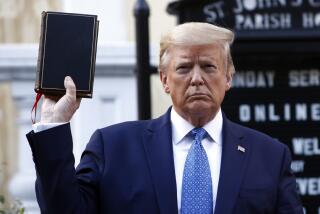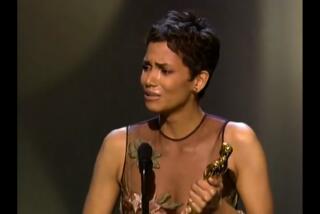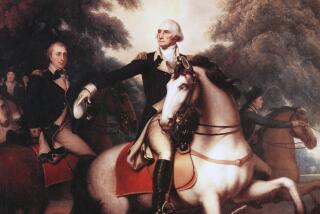Inaugurations almost always invoke religion
Like so many presidents before him, Barack Obama has invited a revered guest to his inauguration: God.
Although the Constitution forbids the government from establishing religion, faith is once again figuring prominently into the nation’s grandest political pageant, just as it has over the course of American history.
Whether Republican, Democrat or Whig, presidents from the nation’s beginnings have invoked the Almighty’s powerful hand to convey their visions in times of calamity and contentment alike.
George Washington credited the birth of a young America to “providential agency.”
Abraham Lincoln, delivering his second inaugural shortly before the end of the Civil War, said God was punishing a bloodied people for the evils of slavery.
John F. Kennedy called in the middle of the Cold War for heeding the command of the prophet Isaiah “to let the oppressed go free.”
In his inaugural address, George H.W. Bush announced, “My first act as president is a prayer. I ask you to bow your heads.”
Atheists, agnostics and others have long objected to the use of religious language and symbols in inaugurations and in other functions of government.
A collection of groups and individuals -- led by a California attorney who has filed unsuccessful lawsuits to remove God from the Pledge of Allegiance and money -- sued again to keep “so help me God” out of the inaugural ceremony. (A judge last week refused to grant the request.) The phrase is not mandated by the Constitution but has been uttered repeatedly by presidents, following a precedent some historians believe was set by Washington at his first inauguration April 30, 1789.
Some legal scholars and historians label such “ceremonial deism” constitutionally permissible because it reflects culture and tradition more than religion. As a result, experts believe God will continue his inaugural role, just as he has for more than two centuries.
Washington used “religion in public life to promote national identity and cohesion,” to “authenticate public acts” and to communicate fundamental values to an infant country, according to a forthcoming book, “Religion and the American Presidency.”
“Presidents have recognized that the American people are overwhelmingly religious,” said Gaston Espinosa, the book’s editor and an associate professor of religious studies at Claremont McKenna College.
“These inaugurals and religious language are used to bring the nation together and to show that God is looking over the people.
“It’s an affirmation of the role religion plays in American polity, but it’s also a way of respecting the boundaries that the Founders set,” Espinosa added. “They wanted to avoid the extremes of church and state being blended . . . and of trying to eradicate the church from all discourse.”
Religion will infuse this week’s inaugural festivities.
Aside from the oath, Obama has invited ministers to deliver prayers before, during and after the inauguration. The openly gay Episcopal bishop from New Hampshire, V. Gene Robinson, delivered the invocation for the opening inaugural event Sunday at the Lincoln Memorial.
The Rev. Rick Warren of Orange County’s Saddleback Church, one of the largest evangelical congregations in the country, will give the inaugural invocation. The Rev. Joseph E. Lowery, a civil rights leader, will deliver the benediction.
On Wednesday, the Rev. Sharon E. Watkins, the general minister and president of the Christian Church (Disciples of Christ) will give the sermon at the National Prayer Service in Washington, D.C.’s National Cathedral.
Atheists, humanists and other groups argue that the inauguration’s many religious features violate the 1st Amendment’s ban against government establishment of religion.
Eleven groups and 30 individuals sued Chief Justice John G. Roberts Jr., Warren, Lowery and others involved in the inauguration to strip the “God” language from the oath and stop the inaugural prayers. The groups also object to the president-elect’s plan, like those before him, to swear the oath on a Bible.
Lead plaintiff Michael Newdow, a Sacramento attorney, pointed out that the Constitution requires the incoming president only to swear that he “will faithfully execute the office of president” and defend the Constitution. It does not require the use of a Bible.
“The government is not supposed to be taking sides,” Newdow said. “When we use ‘so help me God,’ we are saying that those who believe in God are better than those who do not believe in God. This is about people who want the government to treat every religious view equally.”
Also not required is a morning worship service, a custom observed almost every term since Franklin D. Roosevelt visited St. John’s Episcopal Church in Washington before his 1933 inauguration.
Since Washington took his oath 220 years ago, presidents have avoided mentioning Jesus by name, walking a fine line between embracing their faith without seeming to endorse one religion over another.
This balancing act has given rise to a whole genre of euphemisms. Among them: Divine Author (James Monroe), Almighty Power (William Henry Harrison) and Divine Being (Martin Van Buren).
According to the Joint Congressional Committee on Inaugural Ceremonies, almost all presidential inaugural addresses have included some reference to God. The only exception: Washington’s second address, which was only 135 words.
Early in his first inaugural address during the Great Depression, Roosevelt sought to reassure jittery citizens with his famous phrase, “The only thing we have to fear is fear itself.” Yet, at the end of the address, he also publicly sought the intervention of a higher source.
“In this dedication of a nation we humbly ask the blessing of God,” he told the country. “May he protect each and every one of us. May he guide me in the days to come.”
--
More to Read
Get the L.A. Times Politics newsletter
Deeply reported insights into legislation, politics and policy from Sacramento, Washington and beyond. In your inbox three times per week.
You may occasionally receive promotional content from the Los Angeles Times.










